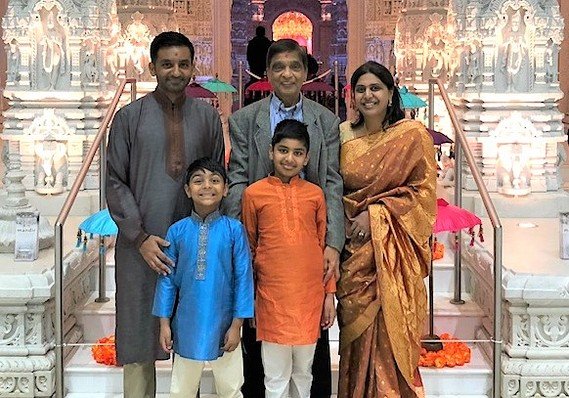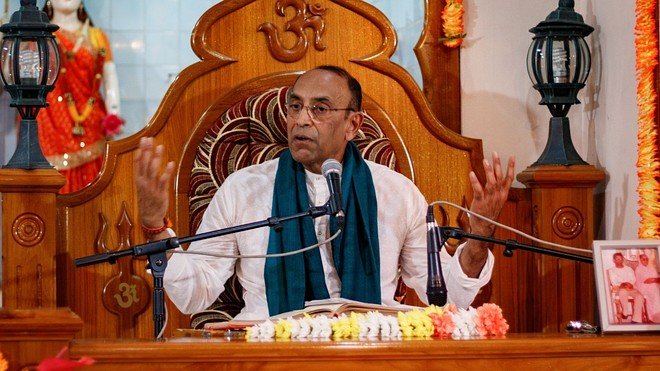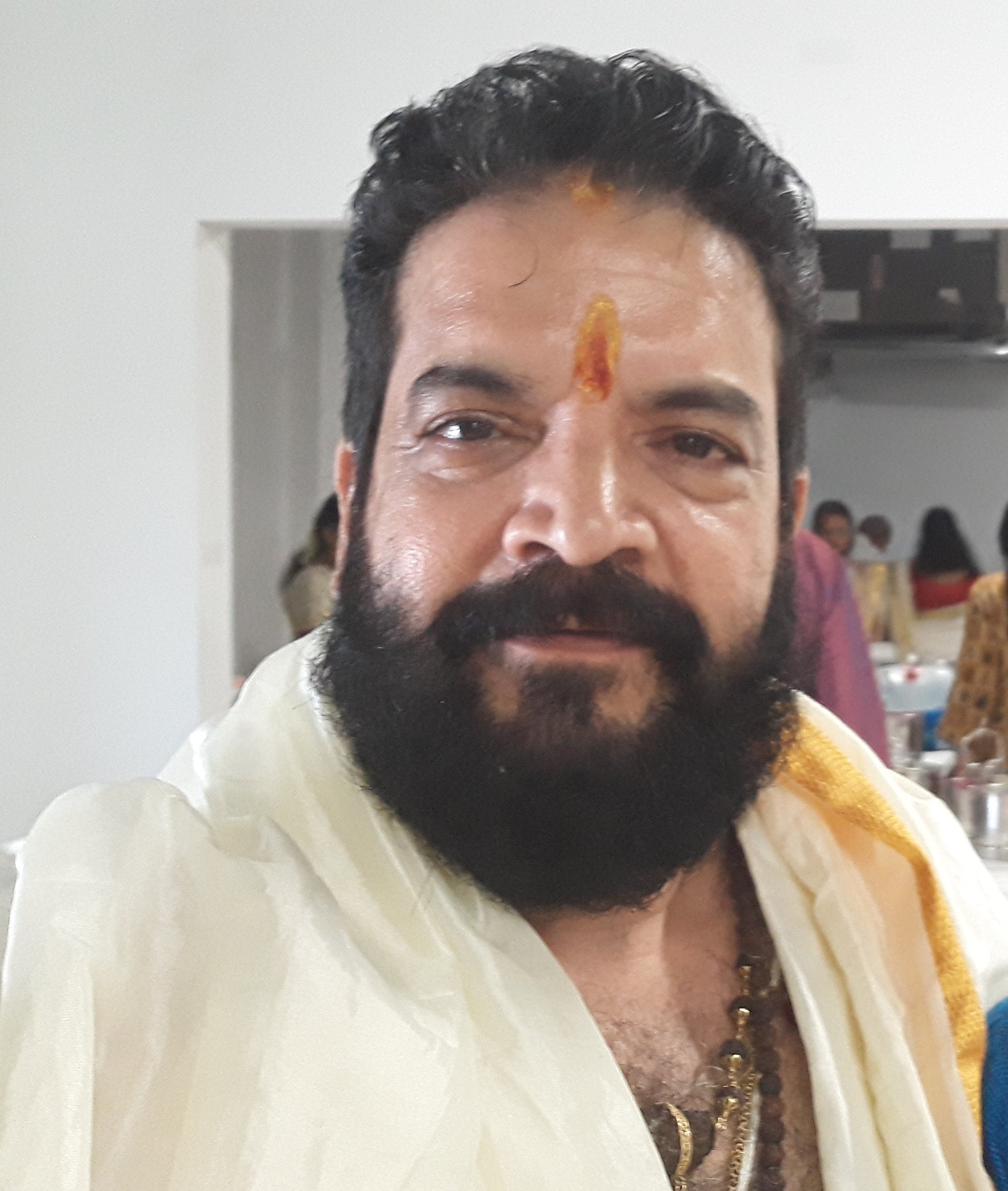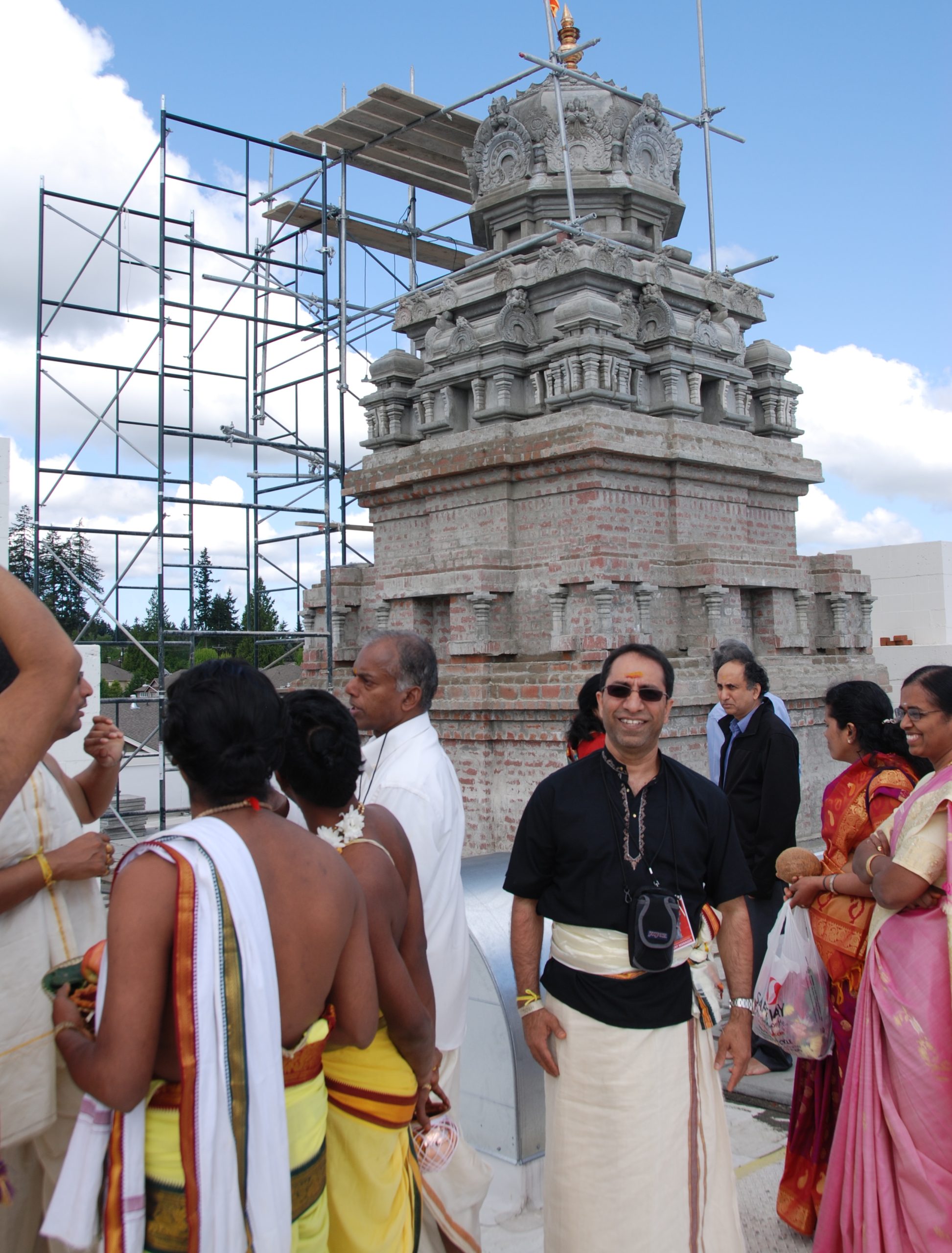Practicing Hindus across the United States have almost seamlessly transitioned worship to home and virtual settings, finding comfort and guidance through digital means amid pandemic-induced temple closures.
At the same time, temple leaders are plotting how to reopen safely — especially leading up to major fall holidays that traditionally draw big crowds.
BAPS Swaminarayan Sanstha, a global Hindu spiritual and humanitarian organization founded in Gujarat, India, suspended public activities at its roughly 100 U.S. temples on March 13, two days before the U.S. Centers for Disease Control and Prevention advised against gatherings of 50 or more people.
But the organization quickly supplied devotees with a raft of online resources, including weekly religious services for different age groups in English and Gujarati, special prayer ceremonies for the resolution of the pandemic, livestreams of swamis (Hindu monks) performing ceremonies and instructing viewers on how to take part at home, daily darshans (viewing photos of sacred images), and a daily livestreamed aarti (a ceremony involving lighted wicks waved before sacred images to infuse them with blessings), said Darshan Patel, a volunteer for BAPS Shri Swaminarayan Mandir, a temple in Robbinsville, N.J.
Patel, 31, of Bordentown, N.J., said that his family’s existing practice of ghar sabha, or home assembly, has received greater emphasis in their newly homebound life — and helped him and his wife connect virtually with his parents, who live in Toronto.
“Whether it’s my family or even some other friends that I have … they find that their home assemblies have really helped them to strengthen their resolve while they cope with the challenges of COVID-19,†he said.
Rupel Patel, a volunteer (no relation to Darshan Patel) who coordinates women’s and children’s activities at the Robbinsville temple, said she has been participating in temple webcasts with her family. With limited trips outdoors due to her immunocompromised condition, she has used the extra time at home to focus on her spirituality.
“We have more time to really reflect on the messages and how all of us can use this time to support each other, to support others, to make sense of what we’re going through … especially for the kids,†Rupel Patel, 40, told MarketWatch. “I sometimes think, ‘How have I made it this long without being out there in the world?’ I think this spirituality has a lot to do with that.â€
Anantanand Rambachan, a professor of religion at St. Olaf College in Minnesota who both studies and practices Hinduism, teaches regularly at his temple on weekends. Rambachan, 68, now delivers those religious lectures via Zoom ZM,
Of course, Hindus are not alone in taking their worship virtual during the coronavirus pandemic. A Pew Research Center survey conducted March 19 to 24 found that 59% of U.S. adults who had earlier indicated they attended religious services at least once or twice a month said they were attending services in person less often due to the outbreak, presumably a byproduct of cancellations. Some 57%, meanwhile, said they had instead watched religious services online or on TV.
Overall, 55% of adults surveyed by Pew said they had prayed for an end to the virus’s spread.

Rupel Patel, a volunteer who coordinates women’s and children’s activities at the Robbinsville temple, said she has been participating in temple webinars with her family.
Courtesy of Rupel Patel
‘An abundance of caution’
Officials at the Hindu Temple Society of North America in Flushing, N.Y., increased the number of hand-sanitizer stations in late February and closed facilities to the public in the first week of March, said Ravi Vaidyanaat Sivachariar, the temple’s director of religious affairs.
In early March, the Hindu Temple and Cultural Center in Bothell, Wash., a Seattle suburb, reduced its hours to just one hour in the evening, enforced social distancing among templegoers, and ramped up sanitation protocols, temple co-founder Mani Vadari told MarketWatch. The temple closed to the public later that month.
“We tend to follow the state of Washington guidelines very carefully, and at times go one step further — almost what we would call through an abundance of caution,†said Vadari, a 59-year-old engineer who lives in nearby Redmond.
How worshipers have sought comfort
Despite temples having closed to the public, certain rituals must still be carried out every day. “The murti [icon or sacred form] is seen as a special, living, divine presence, and so this requires a regular round of daily rituals to be performed,†Rambachan said. To that end, priests have continued to come and go from the temple premises while cameras transmit the visuals to devotees. Some priests even reside in temple accommodations.
Individuals can also request that priests perform specific pujas (prayer rituals) on behalf of their families. Vadari said some devotees have requested Annaprasanam rituals, during which a baby is offered solid food for the first time, while many have asked for Ganesh puja or Satyanarayana puja for “broader peace of mind.†Some temples have also offered virtual priest services to guide families through funeral rites.

Anantanand Rambachan, a professor of religion at St. Olaf College who both studies and practices Hinduism, teaches regularly at his temple on weekends.
Courtesy of Anantanand Rambachan
“ ‘We all deal with it in different ways, and looking towards religion and looking up to God is a big part of it.’ â€
Radhakrishnan Namboodiri, the priest of the Sri Ayyappa Society of Tampa in Tampa, Fla., said he had been receiving requests from members of his community for pujas, prayers and advice. People are most likely to raise issues about their health, Namboodiri, 57, told MarketWatch — “not money, not wealth.†Some, he said, work in health care.
“People are looking for comfort — mental, emotional, psychological comfort,†Vadari said. “We all deal with it in different ways, and looking towards religion and looking up to God is a big part of it.â€
BAPS Charities, BAPS’s charitable affiliate, has coordinated a flurry of relief efforts, including donations of food and personal protective equipment for health-care workers. It has also launched a COVID-19 awareness campaign in multiple languages, Darshan Patel said.
The Flushing temple, which has coordinated its own deliveries of food and health-care supplies, has livestreamed on Facebook FB,
Vadari said the Bothell temple had made an effort to circulate information pertaining to small-business relief and unemployment benefits, including through the temple’s Facebook page, its website and an email newsletter.

Radhakrishnan Namboodiri, the priest of the Sri Ayyappa Society of Tampa, says he has been receiving requests for pujas, prayers and advice.
Courtesy of Radhakrishnan Namboodiri
Hinduism’s ‘ability to adapt’ to the pandemic
Rambachan, the Hindu religious scholar, said the very nature of Hinduism allows for a good measure of flexibility — and, now, the capacity to adapt to pandemic conditions.
While temples serve as important social spaces and many Hindus are in the practice of visiting them, particularly for major religious occasions, temple-going is “not a requirement of Hindu identity,†he said. Hindu worship is not structured in a congregational fashion as some other religions are, he added, and a significant part of worship takes place in the home — typically in a designated section of a room, where religious icons are displayed.
What’s more, a priest’s physical presence does not quite have the same significance in Hinduism as it might in, say, Catholicism, Rambachan said. “In the Hindu tradition, you are performing your own worship,†he said. “The role of the priest is simply to guide — he leads you through the ceremony.â€
For those reasons, it has been relatively easy for Hindu communities in the U.S. and elsewhere to adapt their rituals to online formats, he said — even prior to COVID-19.
“On the whole, I think that the Hindu tradition has exemplified creative flexibility and an ability to adapt under these circumstances,†Rambachan said. “So far, it has been working well.â€
“ Looking ahead to reopening, Sivachariar said the Flushing temple would enforce handwashing, assess what additional medical supplies might need to be added to its first-aid kit, and potentially only allow devotees into the temple in batches. â€
What temples could look like post-COVID-19
Temple officials say they’ll follow state and local guidance on when to reopen. But certain precautions are in order after they open doors to the public — especially with major fall festivals like the nine-day Navrathri and five-day Diwali on the horizon.
“We will be getting into big-time puja season by the time we get into September, October, November, December,†said Vadari of the Seattle-area temple. “We want to be prepared well in advance to plan for these things, manage these things, and still provide just an absolutely fantastic religious and spiritual experience to everybody.â€

‘Clean, clean, clean — we’re sanitizing like nobody’s business,’ said Mani Vadari, a co-founder of the Seattle-area temple.
Courtesy of Mani Vadari
Looking ahead to reopening, Sivachariar said the Flushing temple would enforce handwashing among visitors, assess what additional medical supplies might need to be added to its first-aid kit, and potentially only allow devotees into the temple in batches. A dining facility built to accommodate 300 people at a time might operate at reduced capacity, he added, with fewer tables set farther apart.
“We hope normalcy will not happen all of a sudden,†he said. “There will be definitely a warm-up time.â€
The Robbinsville temple might adjust how devotees receive blessings during aarti ceremonies, during which lighted wicks are passed around, to limit physical interactions, Darshan Patel said. “Considering social distancing, it’s foreseeable that maybe the amount of people performing abhishek at one time may be limited,†he added, referring to the ritual of showering an icon with water or milk. Templegoers’ practice of seva, or selfless service that includes food preparation and cleaning, might be limited or staggered in timing to maintain social distance, he said.
“We are suspecting that we will continue no prasadam [food offered to God and later consumed by worshipers] and no personal touch indefinitely, until we reevaluate,†Vadari said. “And clean, clean, clean — we’re sanitizing like nobody’s business.â€
Temple officials are considering various ideas to limit the number of devotees inside the building at one time, including a ticketing method through which people can reserve a time to visit and a volunteer at the door letting in one person as another leaves, Vadari said. But so far, he said, “nothing is fully baked in.â€
“With the pandemic going on and people being sequestered in their homes, there is a need for that religious and spiritual connection, which many of us Hindus have with our temple,†Vadari said. “We want to make sure that we support that, but at the same time in a meaningful and a socially distant manner so that we don’t become a hot spot for something. We want to be very, very careful of that.â€






